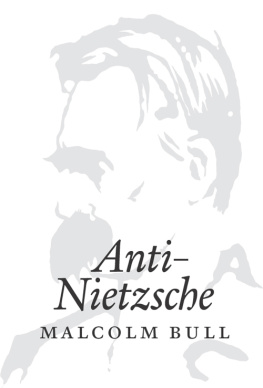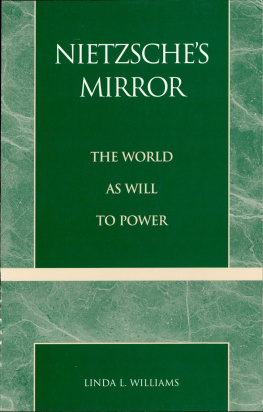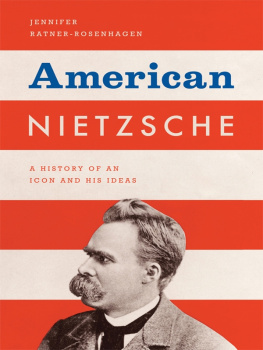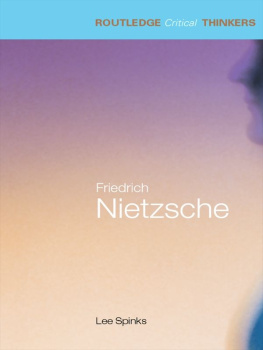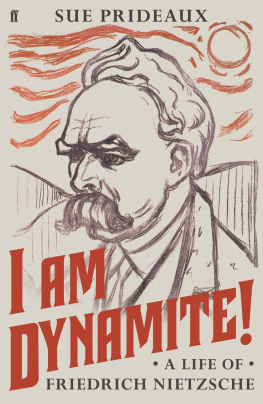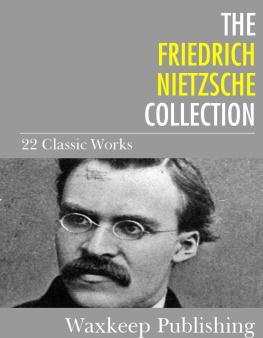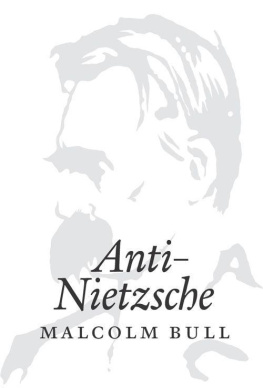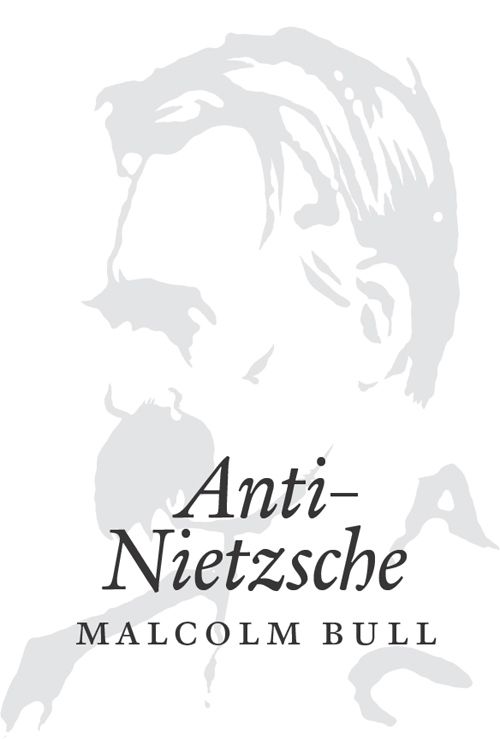ANTI-NIETZSCHE
ANTI-NIETZSCHE
MALCOLM BULL

First published by Verso 2011
Malcolm Bull 2011
All rights reserved
The moral rights of the author have been asserted
1 3 5 7 9 10 8 6 4 2
Verso
UK: 6 Meard Street, London W1F 0EG
US: 20 Jay Street, Suite 1010, Brooklyn, NY 11201
www.versobooks.com
Verso is the imprint of New Left Books
e-Book ISBN-13: 978-1-84467-893-8
British Library Cataloguing in Publication Data
A catalogue record for this book is available from the British Library
Library of Congress Cataloging-in-Publication Data
A catalog record for this book is available from the Library of Congress
Typeset in Fournier by Hewer Text UK Ltd, Edinburgh
Printed in the US by Maple Vail
Contents
Foreword
This book belongs to the many, to anybody in factwhich means, of course, that it belongs to no one.
What if the world itself were like that? For Nietzsche, the sense of the world does not lie outside the world but rather within the world, where (as Wittgenstein puts it) everything is as it is, and everything happens as it does happen. If the sense of the world lies inside the world, then the meaning of the world can only be given by the things in ittheir meaning its meaning. That is another way of saying that the meaning of the world is a question of population, and that arguments about its meaning must be determined through its demography and ecology.
If the sense of the world lies within it, nonsense lies without. If the world loses meaning, then that can only be because nonsense has taken the place of sense. The nonsense of the world, too, must be determined through its demography and ecology. Nietzsche calls the process through which nonsense comes into the world nihilism and attributes it to the slave revolt in morals. Seeking to complete the process, and so bring nihilism to an end, Nietzsche describes an ecology in which the nonsense of the world is as it is forever.
The argument of this book is that Nietzsches solution, far from being the completion of nihilism, is merely an attempt to arrest it. By excluding any future exchange of nonsense for sense, he also excludes any further exchange of sense for nonsense. Yet if, as Nietzsche himself asserts, such exchanges are ultimately just changes in the population of the world, his particular ecology can always be undermined by one that is more negative still. Why then does Nietzsches nihilism still function as the limit-philosophy of the modern imaginary? This book suggests that there can be no humanist response to Nietzsche that does not augment rather than diminish the meaning of the world. Any ecology more negative than Nietzsches must be a subhuman one, for only where nihilism moves beyond scepticism to failure does it fall below the reach of the transcendental arguments that turn nonsense back into sense.
Positive ecologies generate their own political meanings, but a negative ecology is an invitation to political theory. As Hobbes was perhaps the first to realise, political theory is a theory of populations without meanings, needed whenever the world loses some of its sense. That is why Nietzsche himself becomes a political theorist. The corollary of this is that political theory becomes impossible without nonsense. Is there some way to let the sense escape from Nietzsches world? Suffocated by meanings we cannot understand, we must circle its limits looking for an opening, the crack that will let the nonsense in.
Acknowledgements
Earlier versions of some chapters were first published or presented elsewhere: chapters to the Seminar in Political Thought and Intellectual History at Cambridge. I am particularly grateful to my respondents on these occasionsT. J. Clark, Henry Staten, Judith Butler, and Anthony J. Cascardi at Berkeley, and Raymond Geuss in Cambridgeand also to my editors at New Left Review, Robin Blackburn, Perry Anderson, and Susan Watkins. At various points along the way encouragement has come from, among others, Julian Stallabrass, Barry Schwabsky, Gopal Balakrishnan, and Timothy Morton. My greatest debts are, as always, to Jill Foulston.
1
Philistinism
At last the horizon appears free to us again, even if it should not be bright; at last our ships may venture out again, venture out to face any danger; all the daring of the lover of knowledge is permitted again; the sea, our sea, lies open again; perhaps there has never yet been such an open sea.
Nietzsche
Believing that philistinism was not mere vulgarity but the antithesis par excellence of aesthetic behaviour, Adorno expressed interest in studying the phenomenon as a via negativa to the aesthetic. But the project remained unrealised, and although he frequently made dismissive or insulting remarks about philistines, he never bothered to investigate what, if anything, philistinism might be. In this respect, his attitude was characteristic of the discourse against philistinism that had been in circulation since the nineteenth century. Nevertheless, in his unfulfilled desire to study the philistine, Adorno opened the way to a revaluation of that tradition, for upon closer examination the philistine proves to be a figure of greater historical and intellectual importance than Adorno imagined.
On the face of it, the type of study Adorno had in mind should be relatively straightforward. A glance at the newspapers suggests that we are surrounded by philistines. We live, according to the critic D. J. Taylor, in a philistine age, and have, as another commentator noted the previous day, a government of philistines.
Perhaps such protests should lead us to conclude that philistinism is something endemic to ruling classes. This was certainly the view of one contributor to the letters pages of Opera magazine, who concluded that: If there is such a thing as the English disease, it is, I submit, Philistinism in high places.
Like Adorno, who believed that the philistines anti-artistic attitude verges on sickness, Thompsons analysis allows us to define the philistine position more precisely. The philistine should argue not that existing objects are of temporary as opposed to durable aesthetic value, or that, although they may once have been or may yet become valuable, all existing objects are valueless, but that all objects are permanently aesthetically valueless. In consequence, any object whose value is derived solely from its classification as an art-object is fit only for recycling. With this in mind, it is easy to see that certain positions that are sometimes described as philistine are not really philistine at all. For example, people who value popular culture in the same way as high culture, or who prefer popular culture to high culture, are just promoting the transient at the expense of the durable or revaluing the transient as durable.
The position of anti-art movements like Dada is less clear. Dada certainly gave expression to the philistine impulse, but although its rhetoric was vigorously anti-aesthetic, what actually happened in the creation of a ready-made was that something that had the transient aesthetic value of a machine-produced object or was even an object of no value at all was then treated as though it were a durable object of lasting aesthetic value. It is therefore misleading to suggest that the ready-made says art is junk;art galleries. Treating junk as art differs from treating art as junk in just the same way that pantheism differs from atheism, or a multiculturalist respect for all moralities differs from the nihilist disregard for any morality. One is an inclusive extrapolation of value, the other its direct negation.

